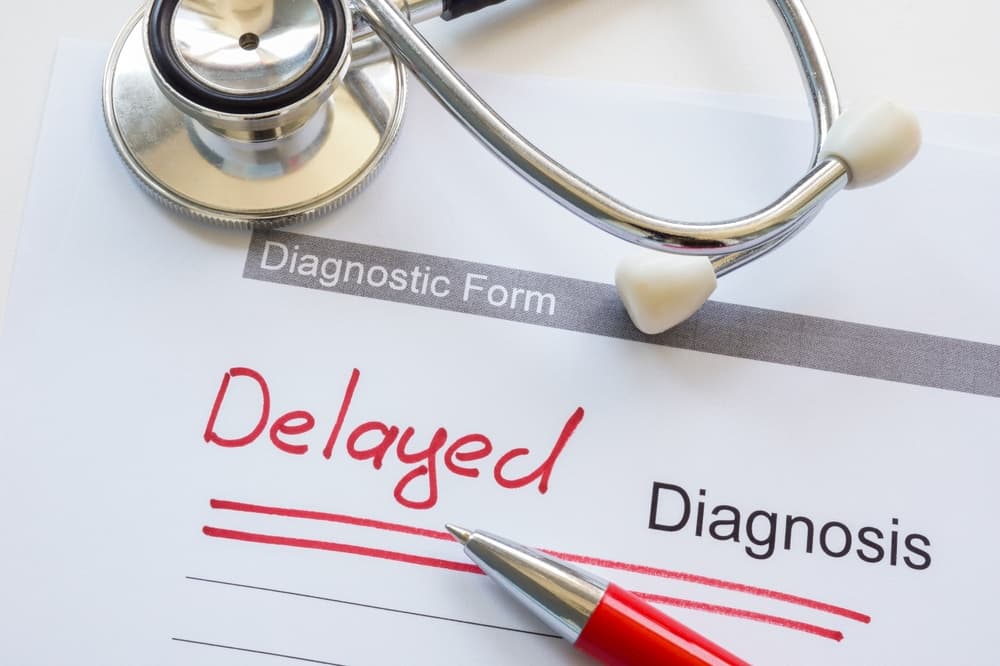When cancer strikes, time is more precious than ever. A few weeks or months can mean the difference between a treatable disease and one that’s spread too far to control. If a doctor fails to diagnose cancer promptly, the consequences can be devastating.
For many patients, working with a Connecticut medical malpractice lawyer to file a delayed cancer diagnosis claim offers a path to recover financial losses and seek justice for the pain, suffering, and uncertainty caused by medical mistakes.
Compensation for a delayed cancer diagnosis can help cover medical bills, lost income, and other costs tied to a physician’s failure to provide a timely diagnosis. If you believe you’re suffering from the consequences of a delayed cancer diagnosis, knowing your rights and what the legal system can do for you is a good place to start making informed decisions about your future.
How Delayed Diagnosis Happens—and Why It’s So Dangerous

A delayed diagnosis isn’t always the result of a simple oversight. Often, it stems from medical negligence. Doctors and other healthcare providers are trained to consider a patient’s symptoms, order appropriate diagnostic tests, and interpret results correctly. When they don’t, patients can suffer life-altering harm.
Delayed diagnosis occurs when a physician fails to identify cancer in its early stages, only for the correct diagnosis to come later. During that gap, the cancer can grow or spread, requiring more aggressive treatment and lowering a patient’s chances of recovery. The delay may result from:
- Ignoring or dismissing a patient’s symptoms
- Failing to order proper diagnostic tests, such as biopsies or imaging scans
- Misreading test results
- Failing to refer the patient to a specialist
- Misdiagnosing cancer as another, less serious condition
For example, a doctor might dismiss ongoing abdominal pain as acid reflux when the real problem is colorectal cancer. Or a persistent cough might be brushed off as a mild infection rather than lung cancer. These mistakes can lead to delayed cancer diagnoses that carry steep physical and emotional costs.
The Toll of a Delayed Cancer Diagnosis on Patients and Families
Learning that your cancer diagnosis should have come sooner is devastating. Not only are you dealing with the shock of cancer itself, but you’re left wondering what might have happened if your condition had been caught earlier.
A delayed diagnosis can result in:
- More advanced-stage cancer at the time of discovery
- The need for more aggressive treatment, such as extensive surgery, chemotherapy, or radiation
- Higher medical expenses
- Longer recovery times
- Reduced chances of survival
- Chronic pain and physical limitations
- Emotional distress and anxiety
These outcomes don’t just impact patients. Families also carry a heavy burden, juggling medical care, lost wages, and the emotional strain of watching a loved one suffer.
Sadly, in the worst cases, a delayed cancer diagnosis results in wrongful death. Surviving family members may be entitled to compensation for funeral costs, lost financial support, and the deep personal loss they’ve endured.
Which Cancers Are Commonly Misdiagnosed or Diagnosed Late?

Some cancers are more prone to delayed diagnosis than others because their early symptoms can be subtle or mistaken for minor health issues. Cancers commonly involved in delayed diagnosis cases include:
- Colorectal cancer: Symptoms like abdominal discomfort, blood in stool, or changes in bowel habits are often mistaken for less serious gastrointestinal issues.
- Lung cancer: Chronic cough, chest pain, and shortness of breath can be attributed to infections, asthma, or smoking-related conditions.
- Prostate cancer: Early stages may have few or no symptoms, making regular screenings critical.
- Cervical cancer: Often detected through routine Pap smears, but delays can occur if testing is skipped or abnormal results are overlooked.
- Breast cancer: Lumps or changes in breast tissue can sometimes be dismissed or misinterpreted on imaging studies.
A doctor who fails to consider cancer as part of a differential diagnosis may miss the opportunity for early detection, leaving the patient vulnerable to worsening disease.
What Medical Errors Lead to a Delayed Cancer Diagnosis?
Medical malpractice in delayed cancer diagnosis cases can take many forms. Here’s how healthcare providers sometimes fall short:
- Not listening carefully to the patient’s complaints: Dismissing persistent or unusual symptoms can mean missing warning signs.
- Failure to take a thorough patient history: Family history and prior medical conditions often influence cancer risk and screening decisions.
- Ordering inappropriate diagnostic tests: Skipping tests or ordering the wrong ones can delay an accurate diagnosis.
- Misinterpretation of test results: A radiologist might miss a suspicious mass on an imaging scan, or a pathologist could misread biopsy slides.
- Delays in follow-up care: Doctors must act quickly on abnormal findings. Postponing follow-up can be just as harmful as failing to test in the first place.
These errors aren’t harmless oversights. They can result in life-threatening consequences. Medical professionals are held to a standard of care that requires vigilance in assessing a patient’s symptoms and risk factors. Falling below that standard may constitute medical negligence.
How Medical Malpractice Claims Work in Delayed Diagnosis Cases
Pursuing delayed cancer diagnosis compensation means filing a medical malpractice claim. But these claims are complex. To succeed, you must prove several key elements:
- Doctor-patient relationship existed: You must show that the doctor or healthcare provider owed you a duty of care.
- The provider was negligent: The provider’s care fell below the standard expected of reasonably skilled healthcare professionals under similar circumstances.
- The negligence caused harm: The delay in diagnosis must have worsened your condition or reduced your chances of successful treatment.
- You suffered damages: This can include medical costs, lost wages, physical pain, emotional distress, and other financial losses.
In a delayed cancer diagnosis case, much of the evidence comes from medical records, test results, and expert opinions from other medical professionals. Your attorney will typically work with oncologists, radiologists, and other specialists to prove how a timely diagnosis could have changed your outcome.
Damages Available in Delayed Cancer Diagnosis Claims
A delayed cancer diagnosis can lead to significant financial and personal losses. Compensation in a medical malpractice lawsuit may include:

- Medical expenses: Past and future costs for cancer treatment, hospital stays, surgeries, medications, rehabilitation, and follow-up care.
- Lost income: Wages lost during treatment and recovery, as well as diminished future earning capacity.
- Pain and suffering: The physical pain and emotional turmoil of battling advanced cancer.
- Loss of enjoyment of life: Missing out on everyday activities and milestones.
- Emotional distress: The anxiety and mental anguish associated with serious illness and uncertainty.
- Wrongful death damages: For families who lose a loved one, compensation may include funeral costs, loss of companionship, and financial support.
Some states impose limits on certain types of damages, especially non-economic damages like pain and suffering. In Connecticut, for example, there’s no cap on compensatory damages, but punitive damages are limited to the actual cost of the litigation, including attorney's fees.
Every case is unique, so speaking with a medical malpractice attorney is essential to understand what your claim might be worth.
How Much Compensation Can You Get for a Delayed Cancer Diagnosis?
No two cases are the same when it comes to delayed cancer diagnosis compensation. The amount you might recover depends on several factors:
- Type and stage of cancer: A cancer that’s more advanced because of the delay generally leads to higher damages, due to more aggressive treatment needs and a poorer prognosis.
- Extent of medical treatment required: Longer, costlier treatment regimens increase both economic and non-economic damages.
- Impact on your life: Physical limitations, emotional distress, and disruption to your daily life all influence compensation amounts.
- Loss of income and earning potential: If you can’t return to your job or have to take a lower-paying position, you may be entitled to recover these financial losses.
- State-specific laws: Each state has its own rules for damages caps, filing deadlines, and requirements for expert testimony in medical malpractice lawsuits.
It’s impossible to calculate an exact dollar figure without reviewing the unique details of your case. However, settlements and verdicts for delayed cancer diagnosis claims often range from tens of thousands to several million dollars, depending on the severity of harm and the evidence of negligence.
Why Early Diagnosis Matters So Much in Cancer Cases
Cancer is not a single disease but a collection of diseases, each behaving differently. However, one principle remains consistent across nearly all types of cancer: the earlier it’s detected, the better the chances for effective treatment and survival.
Delayed diagnosis often means:
- Cancer spreads to lymph nodes or distant organs
- Less chance for minimally invasive treatments
- Higher likelihood of requiring chemotherapy or radiation
- More extensive surgeries with longer recovery times
- Increased physical pain and emotional trauma
- Greater medical expenses over the long term
For example, early-stage lung cancer may be removed surgically with a high chance of cure. But if the diagnosis happens later, the cancer might be inoperable and require aggressive treatments that carry serious side effects. The stakes could hardly be higher.
Timely cancer diagnosis is critical for improving survival rates and quality of life. When a healthcare provider’s negligence robs you of that opportunity, the law provides a path to hold them accountable.
Filing Deadlines: Don’t Let Time Run Out on Your Claim
One of the biggest pitfalls in pursuing delayed cancer diagnosis compensation is missing the deadline to file your claim. Each state imposes strict time limits known as statutes of limitations.
In Connecticut, for instance, medical malpractice lawsuits generally must be filed within two years from the date you discovered—or reasonably should have discovered—the injury. However, there’s also a statute of repose that bars claims after three years, regardless of when you discovered the harm.
Some exceptions may apply, such as when the victim is a minor or when fraudulent concealment has occurred. Because these deadlines can be unforgiving, contacting an experienced medical malpractice attorney as soon as possible is the best way to protect your potential claim.
How a Medical Malpractice Attorney Can Help

Medical malpractice cases involving delayed cancer diagnosis are rarely straightforward. They require deep knowledge of both medical standards and legal procedures. An experienced medical malpractice attorney can:
- Investigate your case thoroughly: This includes gathering medical records, consulting medical experts, and identifying precisely how the delayed diagnosis occurred.
- Calculate the full value of your claim: Your lawyer will account for current and future medical costs, lost wages, and the human impact of your ordeal.
- Prove causation: It’s crucial to show that the delay directly contributed to your worsened condition or lower survival chances.
- Handle negotiations with insurers: Insurance companies often try to settle malpractice claims for less than they’re worth. An attorney will fight for the full compensation you deserve.
- Represent you in court if necessary: Many malpractice claims settle out of court. However, if the insurance company refuses to offer a fair amount, your lawyer can present your case to a jury.
Without skilled legal help, victims often struggle to prove medical negligence and obtain fair compensation. A qualified lawyer levels the playing field against powerful healthcare providers and insurers.
FAQs About Delayed Cancer Diagnosis Compensation
Can I sue a hospital as well as my doctor?
Yes. Hospitals can be held responsible if errors by their staff, poor communication, or system failures contributed to your delayed cancer diagnosis. A malpractice claim may include both the doctor and the facility if multiple parties share blame for what happened.
Is it malpractice if my cancer was eventually diagnosed?
It could be. Even if doctors diagnosed your cancer later, a delay can still count as malpractice if it led to more serious illness, harsher treatments, or reduced survival chances. The key question is whether other doctors would have diagnosed your cancer sooner under similar circumstances.
Can I file a claim if my loved one died from a delayed diagnosis?
Yes. If a delayed cancer diagnosis led to a loved one’s death, you may be able to bring a wrongful death claim. These cases can recover compensation for funeral costs, lost financial support, and the profound emotional loss suffered by surviving family members.
How long does a delayed diagnosis lawsuit take?
Timelines vary. Some cases settle in several months, especially if liability is clear, while others can take years if complex evidence or court schedules delay progress. Your lawyer can give you a realistic estimate based on the details of your claim and the willingness of the insurance company to negotiate.
Will my lawsuit affect my medical care?
It shouldn’t. Filing a lawsuit should not interfere with your ongoing cancer treatment or other medical needs. However, if you’re uncomfortable staying with the same doctor or hospital, your attorney can help you find new providers and ensure your medical records are transferred properly.
Key Takeaways
- Delayed cancer diagnosis compensation may cover medical bills, lost wages, and pain and suffering caused by a physician’s failure to diagnose cancer in a timely manner.
- A delayed diagnosis often results in more advanced-stage cancer, requiring aggressive treatment and reducing survival chances.
- Commonly misdiagnosed cancers include colorectal, lung, prostate, cervical, and breast cancer.
- Medical errors contributing to delayed diagnosis include failing to order proper tests, misreading results, or dismissing patient symptoms.
- Pursuing compensation requires proving medical negligence, causation, and damages.
- Each state, including Connecticut, has specific deadlines for filing a medical malpractice claim.
- A medical malpractice attorney can handle these complex cases, fight for fair compensation, and help you move forward after a devastating diagnosis.
Take Action with The Flood Law Firm
If you’re dealing with the consequences of a delayed cancer diagnosis, you deserve answers and justice. The financial costs, physical pain, and emotional weight can feel impossible to bear alone. At The Flood Law Firm, our Connecticut personal injury lawyers have helped individuals throughout our state stand up to negligent medical professionals and insurance companies that try to avoid responsibility.
Our team knows how to uncover the truth, prove malpractice, and fight for your full and fair compensation. We’re trial lawyers with a track record of success, including multimillion-dollar recoveries for clients who were told their injuries weren’t serious enough.
Contact The Flood Law Firm today for a free consultation. Call us at (860) 346-2695 or reach out to us online. Let us handle the legal battle while you focus on taking care of yourself.
